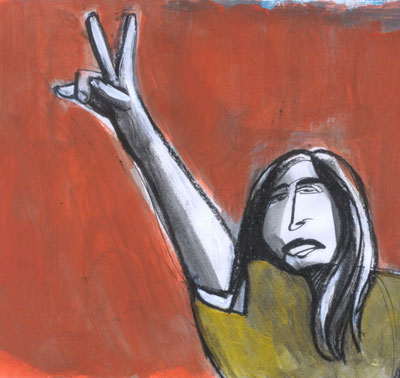 Every Saturday, we’ll be posting a new illustration by David Lester. The Mecca Normal guitarist is visually documenting people, places and events from his band’s 28-year run, with text by vocalist Jean Smith.
Every Saturday, we’ll be posting a new illustration by David Lester. The Mecca Normal guitarist is visually documenting people, places and events from his band’s 28-year run, with text by vocalist Jean Smith.
Oh, I wish I could go and see my Dad this morning. He was so frightened yesterday when my brother and I got to the hospital. I calmed him down, listened to his nightmarish tales, and he was pretty good until it was time for us to leave. He thought his bed was a suitcase. I felt terrible asking him to climb into a fucking suitcase that he thought was just out in the hallway. I asked him to take a few nice deep breaths—hold and exhale. He does it, which amazes me.
When we got there, he was out of his bed in his beige pajamas struggling with the chair and the walker. His eyes were wide, ringed with delicate purple. His face pale. He was terrified. We got him to sit down on the edge of the bed and he talked about things that had gone on in the night. They’d torn the side of the building off, two nurses had been sent home because of him. They wouldn’t talk to him (he means listen; he’s the talker) and he’d refused to take half his pills. He didn’t trust the nurses. My brother went to find the nurse.
“I’m not going to take them just to be a good boy,” Dad said, angrily.
“You trust me, right, Dad? Let’s get the nurse to tell us what the pills are for. You need your heart pill and the one for the infection. Will you please take them for me, Dad?” I said.
The nurse returned.
“Is there water in that?” I asked reaching for the small paper cup on his table.
“Yes.”
My brother handed Dad the little container of pills, and I handed him the water. He took them one by one. The nurse was amazed.
“Thanks, Dad,” I said.
Moira, the social worker, asked Dad a vague question. “How are you going to feel tomorrow about going home?”
All eyes on him, Dad explained that he could not, with any certainty, predict exactly how he’d be feeling at any point in the future and that, based on his present condition, his judgment was not to be trusted.
Moira and Stephanie, the home-care liaison, exchanged a look—as if to say, “This guy’s fucking brilliant.”
Yup, that’s my Dad. I was so proud of him.
Stephanie asked Dad if he was a veteran, thinking that there are services available through that route. My brother said he’d already contacted them without any luck. Stephanie asked if my Dad had a number. He didn’t answer. I was sitting next to him on the bed.
“Do you have a number from the navy, Dad?”
“V46538e,” he said.
Christ. I had no idea.
“How long were you in the navy?” Moira asked.
“Ten months.”
“I think they require a year,” she said, quietly.
It was right at the end of the war when he went from Vancouver to Halifax by train. His generation signed up, risking their lives to fight the Nazis. My Dad signed up to protect my freedom, and now I could to protect his. I knew he wanted to go home as soon as possible, but he was hallucinating. He explained that a piece of quiche had basically gotten up off his plate and slithered over the table and down to the floor.
“You’re on one bad trip, man,” I said.
He laughed and agreed. He knows he’s hallucinating. It seems to get worse with the stress of being left there.
Absurdly enough, I have to go to Miami. I have decided not to check in with them while I’m gone for these four days. There’s nothing I can do from there. I need to make this new record.






